News
Chevron launches CCS project in San Joaquin Valley, California
Chevron announced it is launching a carbon capture and storage (CCS) project aimed at reducing the carbon intensity of its operations in San Joaquin Valley, California.
Chevron aims to reduce its carbon intensity - the amount of CO2 emitted per unit of energy produced - by installing CO2 post-combustion capture equipment, capturing the CO2, and then safely storing it thousands of feet underground. This CCS initiative would begin at Chevron’s Kern River Eastridge cogeneration plant in Kern County, California.

“At Chevron, we believe the future of energy is lower carbon. Reducing the carbon intensity of the energy people rely on day-in and day-out is well-aligned with the ambitions of the Paris Agreement,” said Chris Powers, vice president of carbon capture, utilization, and storage (CCUS) for Chevron New Energies. “We are excited about the opportunity to collaborate and progress this CCS initiative in San Joaquin Valley, a region where we have lived and worked for over a century.”
Chevron has applied to obtain a Conditional Use Permit with the Planning and Natural Resources Department of Kern County and will continue to work with appropriate regulators throughout the process.
In addition to the Eastridge cogeneration project, Chevron is currently evaluating and deploying multiple carbon capture technology demonstrations to mature more efficient and cost-effective capture solutions, potentially enabling future projects, not only for Chevron, but for other industries.
“As Chevron advances to a lower carbon future, we’re identifying ways to advance our operations as well, so we can continue to provide local jobs, support the local economy, and generate local government revenue that supports critical community services,” said Molly Laegeler, vice president, San Joaquin Valley (SJV), Chevron. “We are excited about this Chevron New Energies project and fostering continued collaboration with local regulators throughout this process, not only to position the region to benefit from these lower carbon solutions, but that we continue to protect people and the environment. We believe this project has the potential to benefit the region on many levels and that Kern County is an ideal location for carbon capture and storage.”
An August 2020 report by the Lawrence Livermore National Laboratory that highlighted opportunities for California to become carbon neutral noted, “there are various options for geologic storage sites in the state, but we have identified the most promising first candidates in San Joaquin County and in Kern County,” due to the regions’ geologic and subsurface characteristics, as well as the existing oil and natural gas production.
Chevron is also actively exploring additional opportunities to lower the carbon intensity of its SJV operations, including the blending of H2 with natural gas in combustion, and the potential use of other emerging lower carbon technologies, such as geothermal.
Project support:
Kern Economic Development Corporation President and CEO Richard Chapman said “We have a long history of working with Chevron and have appreciated their significant involvement in our community and the role they have played in Kern County. We are excited to see their commitment to lowering the carbon footprint of their local operations and look forward to seeing the innovation and technology they plan to deploy. These efforts aim to ensure job security and workforce development opportunities and maintain the quality of life we enjoy here.”
State Building & Construction Trades Council of California President Andrew Meredith said “Energy transition efforts such as this project have the potential to create a significant number of good-paying jobs. There are also several skills in oil and gas jobs that are transferable to new energies, especially CCUS. We appreciate Chevron’s continued commitment to California and our workers.”
CA State Sen. Anna Caballero said “As we enter our hottest time of the year, we need to be sure we have enough energy to prevent brownouts and blackouts. This project is designed to serve a dual purpose: ensure we have electricity when we need it and help provide climate action for our Central Valley and California.”

